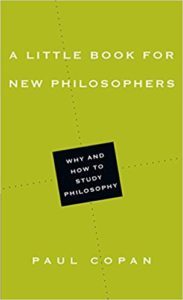Is It Okay to Question Beliefs?
Over the years, I have talked with a number of people who have been told in response to their questioning about God, “You just don’t have enough faith,” or “You just need to read your Bible.” Some were given such a response in their childhood years; others, in their teenage to young adult years. In every situation described, the result was damaging to the person’s belief in God. I don’t know the mind of the responder, nor the reason why such a response would be given. However, I can say that Christians should thoughtfully engage with questions about doubt. 
In Paul Copan’s book, “A Little Book for New Philosophers,” he cites several reasons as to why we should engage. Let’s look at a couple reasons.
-
Doubting is common to the human experience.
God knows his creation. He is not caught off guard by our questioning, even of his own actions. Copan explains that there are instances of humans questioning God’s seeming silence on the issue of evil in the world (Psalm 13, 73). We even see humans questioning his harsh actions; for example, King David’s anger with God when God struck Uzzah dead for steadying the Ark of the Covenant (2 Samuel 6:1-10). The Scriptures do not gloss over human doubt, nor treat it with contempt. In the Scriptures there is much “comfort, guidance and direction for doubting saints.”[1] As Jude 22 expresses, “Have mercy on those who doubt.”
-
Doubts need to be processed, not suppressed.
“Insofar as we are able, doubts should be expressed, sorted out and addressed—and this should be done in Christian community.” Copan describes that we need “godly, thoughtful, and seasoned Christians—philosophers included—to assist us and help strengthen our trust in God along the way.”[2]
Ignoring our doubts, or just getting on with life—in hopes the doubts will work themselves out—can be damaging to our knowledge of God, and therefore to our trust of him. When we doubt God’s existence, we cannot reasonably trust him (Hebrews 11:6). I have found that doubts typically do not just go away. Rather, doubts tend to linger mysteriously in the human mind, affecting many aspects of our life in ways we may not overtly comprehend. So we need to bring our thoughts about God out into the open with those who can aptly and graciously engage those thoughts. 
Therefore, “yes,” it is okay to question beliefs. In reading through the Scriptures, in context, we see that God allows us to wrestle with him in our questioning and even invites us to reason with him. He wants us to use the gift of rationality that he has given to human beings. He is aware that gift will produce difficult questions.
You can pick up a copy of Copan’s short book, “A Little Book for New Philosophers,” here.
[1] Paul Copan. A Little Book for New Philosophers (Downers Grove, IL: InterVarsity Press, 2016), 105.
[2] Ibid., 106.
Original publication date June 12, 2017. Updated September 14, 2021.


![DE[LIVE]RED Speakers](https://maryjosharp.com/wp-content/uploads/2021/03/DELIVERED-Speakers-1024x640.png)